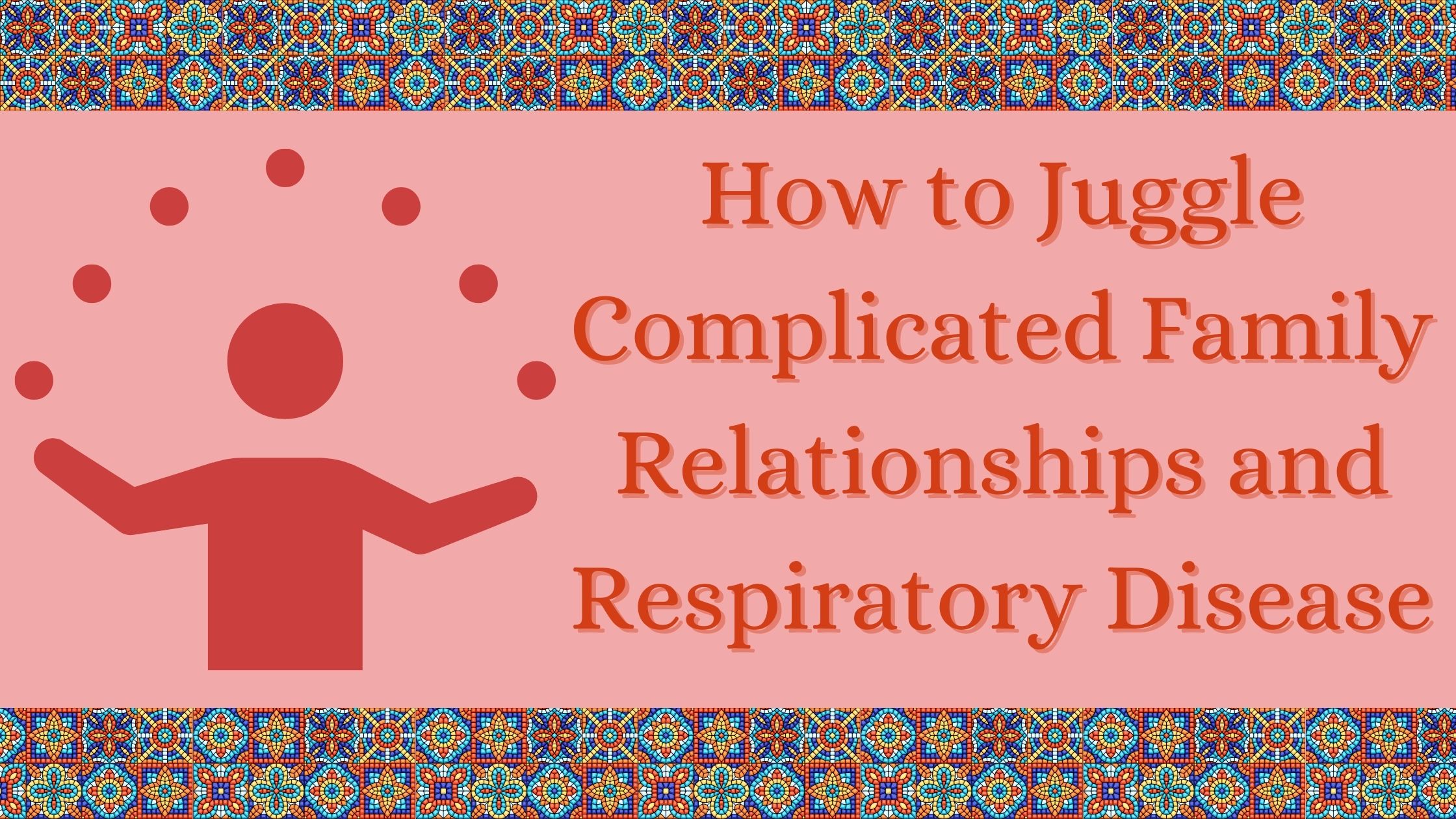
It is a lifelong challenge to live with a respiratory disease, whether it is COPD, pulmonary fibrosis, sleep apnea, or any other chronic illness that makes even the most simple activities harder than it once was.
There is no cure, but there are ways to treat your disease, and live with it rather than against it. It sounds like an impossible concept at first, and it is not an easy course of action. It takes dedication, hard work, patience, and the help of loved ones or caregivers.

You have to maintain a healthy lifestyle, or change your unhealthy lifestyle, quit nasty habits and build new ones. You have to attend your doctors appointments, pulmonary rehabilitation classes, and keep up with your medication, and oxygen therapy.
Balancing family becomes increasingly difficult when your respiratory disease becomes more prevalent, so we wrote this blog to help you manage your disease and your family in the healthiest ways possible.
In this blog we will go over:
- How to better manage your medication
- How to take advantage of oxygen therapy
- How to make time for your family
- Things you can do with your family
- Maintaining a healthy relationship with your family through your disease treatment
Medication

Taking your medication as a respiratory patient is essential for your health, and knowing how and when to use your medication properly is beneficial for many reasons.
- Peace of mind
- Better mood
- Less symptoms
- More time to spend with family if you are feeling well
Bronchodilator

Most bronchodilators are delivered through an inhaler or through a nebulizer so you breathe the medicine straight into your lungs. Knowing how to operate your inhaler is important because they can be used in different ways. The key is to make sure you are getting a full dose of medicine with each breath, so talk to your doctor about the correct way to use your particular inhaler and when.
Corticosteroids
Corticosteroids are usually prescribed to you in special circumstances when your symptoms are more severe and these can be taken as a pill. These steroids can have major side effects and it is important that while you are taking corticosteroids, you are monitored carefully by a family member or caregiver. It is not uncommon to experience weight gain, diabetes, osteoporosis, cataracts and increased risk of infection.
Antibiotics

It is important to avoid bacterial or viral infections, but when they do occur, this may cause exacerbations where you will experience more coughing, more mucus production and more shortness of breath. In these situations your doctor may prescribe you an antibiotic to keep on hand and to take when you have an infection.
Make sure you take all of the antibiotics exactly as prescribed.
Vaccinations

If you have respiratory disease, contracting illness such as influenza (flu), pneumonia, or the coronavirus causing COVID-19 puts you at an increased risk of infection. Flu vaccines are available to protect you against the seasonal flu so you should be getting immunized every year. You need a flu shot every year because the influenza virus changes slightly every year and the newest vaccine will protect you better from the particular flu strain that year.
There are two vaccines that will protect you against pneumococcal pneumonia, which is a bacterial infection in your lungs that often follows an influenza infection. For this, you only need to get the two vaccines once.
To read about respiratory disease and vaccines you can read this article: COPD and Vaccinations: Everything You Need to Know.
Medication and your Family
It is important to take your medication as it is prescribed to you and to get vaccinated. If you go on living without taking the necessary steps to minimize your symptoms and treat your disease, your family will inevitably bear that burden with you.
While your medication will not reverse the damage done by your respiratory disease, taking your medication can open up airways, reduce airway inflammation, and fight bacterial infections making your life easier and more enjoyable.
How to Take Advantage of Oxygen Therapy
.jpg?width=379&name=dreamstime_xxl_58526859%20(1).jpg)
Oxygen therapy is one of the utmost important treatments for lung disease if you have low blood oxygen levels. Using oxygen therapy can reserve hypoxia by increasing your oxygen intake, which can help you live longer, and a higher quality life.
Traveling with Oxygen
Traveling to see family members is out of the question for some respiratory patients, but it does not have to be. Visiting family is hugely important for staying in touch and fostering healthy relationships, but if you use a liquid oxygen tank or compressed gas tank traveling by plane is not an option.
If you have a portable oxygen concentrator (POC), you can take your device with you on just about every airline because POCs are FAA approved.

While we are not advising any respiratory patient to travel far distances during the global COVID-19 pandemic, planning for the future can help cultivate a sense of hope and optimism. Having the correct tools to travel as an oxygen patient is essential for anyone that has to travel by plane to reach loved ones.
If you are going for a road trip, you can charge your battery in the car with the DC adapter that can be plugged into the cigarette lighter of your car, and they are small and compact oxygen devices that are easy to fit in the space by your feet.
Oxygen and Independence
It is a natural process to begin depending on your family and loved ones once your respiratory disease starts progressing. This relationship can add obvious stress within a family, so finding a sense of independence can ease the tension if there is any.
Portable oxygen concentrators like the Caire Freestyle Comfort have a battery that can last 8 hours on a flow setting of 2 with the 16-cell battery allowing you to be out almost all day long with a sufficient supply of oxygen.
This peace of mind alone can give you the freedom and independence to run errands on your own, do your own chorus, and help out with other daily activities. Not to mention, that the Caire Freestyle Comfort is only 5 pounds, so you can easily carry it on your own either in its custom carrying case, or inside your own bag.
How to Make Time for your Family
In the midst of a global pandemic spending time with family has never been more complicated. if you have a respiratory disease it is advisable to not spend time with other people outside of your quarantine bubble.
If you cannot see your family in person safely, communicating virtually is a great option.
You can easily learn how to operate systems like Zoom, Google Hangouts, and FaceTime to communicate with family and friends.
Staying in touch with loved ones can help boost your mood, and give you more energy and ideas for staying busy.
Safe Activities you Can do With your Family

As a respiratory patient, doing certain activities that you once enjoyed might not be as accessible. Your respiratory symptoms will make it harder to do the physical activities you once enjoyed, and your disease can also take a toll on your mental health, mood, and energy.
We wrote a helpful blog that can help you understand the connection between respiratory disease and mood swings, depression, anxiety and other mental health issues: A Resource Guide for COPD Patients who Struggle with Mental Health.
After addressing your physical and mental limitations, you can start to find activities that you can enjoy doing and spending time with your family. Do not overexert yourself, and find activities that are more suited to your new lifestyle.
Ideas include:
- Gardening
- Puzzles
- Board games
- Walking
- Golf
- Going to museums
- Fishing
- Yoga
- Tai chi
Maintaining Healthy Relationships with your Family

Patience is key when dealing with any illness as a patient and as a caregiver, secondly having a lot of empathy.
It is easy to forget what others are going through, especially when your respiratory disease is impacting your health in such a strong way. Remembering that your caregiver and/or family members are going through their own trials and tribulations is important for maintaining a healthy relationship with that person.
Having empathy means having the ability to perceive other people's emotions, coupled with the ability to imagine what someone else might be thinking or feeling. This idea is crucial for any relationship and especially with family, but it is not always easy.
Understanding the way respiratory disease feels if you are a healthy person is essentially impossible. It is also extremely challenging to convey all of the ways having a respiratory disease feels, because sometimes the symptoms are internal and not obvious to any outsider.
If you have a respiratory disease, it can be helpful to talk to others who are going through similar things as you, and relating to their struggles can help you feel less alone in your disease. You can meet people through pulmonary rehabilitation courses and online respiratory support groups.
Overview
Living with a respiratory disease is not easy, and maintaining healthy relationships at the same time is also challenging.
Not to mention, the pandemic has created a rather secluding environment for people especially if you have a respiratory disease, and connecting with family is harder than ever. We urge you to reach out to your family and friends virtually, and connecting socially can help you improve your energy and overall mood.
While traveling by plane is not currently the safest option, having an oxygen device that is capable of coming with you on an airplane is a great motivating factor that will encourage you to travel and see your family more often once it is safe.
It can be defeating to not be capable of doing physical activities you once loved to do, but it is also an opportunity to find new hobbies and activities that you have never tried before, like Tai Chi, golf, or gardening.
Learning new things is a great way to improve your energy and your overall mood as well, and you never know until you try!


.png)





